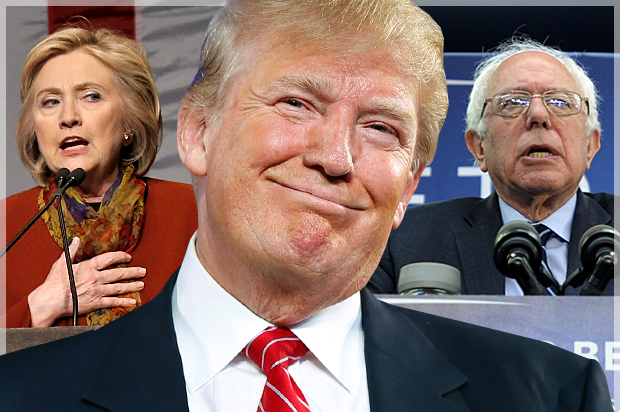It’s looking disastrously good out there for Donald Trump. The March 1 “Super Tuesday” primaries just a few days away, and the March 15 slew of big winner-take-all states come on hot after that, and the GOP’s pupal fascist of a frontrunner is putting up some strong poll numbers pretty much everywhere. He’s running in second place behind Ted Cruz in Texas, he’s edging out John Kasich in Ohio, and he appears to be in a commanding lead over Marco Rubio in Florida. These are three of the biggest states in the primary calendar, and Trump is poised to reap a delegate bonanza from them (Texas’ delegates are allocated proportionally, while Florida and Ohio are winner-take-all). If he performs well in those states and the distressingly large number of other states he’s currently leading, then we’ll very soon be talking about Republican presidential nominee Donald Trump.
Democrats are clearly relishing this prospect. The Democratic National Committee is blasting out releases calling Cruz and Rubio dead-in-the-water losers who obviously can’t hope to halt the Trump train. Democratic opposition research groups have apparently been doing the dirt-digging on Trump that the Republicans have neglected, but they’re sitting on the findings until after Trump becomes the nominee. It’s easy to understand why some Democrats are so eager to face Trump: he’s Donald Trump, a clownish reality TV star with shady business practices who quite deliberately says racist, sexist, and creepy stuff. Sure, he’s won over the GOP electorate, but they’re a bunch of crazies, right? The very idea of this guy becoming president, it’s… it’s just… there’s just no way.
That’s the direction I lean in, mainly because I retain a small, irrational shred of faith that our democratic system can still, at a minimum, keep someone as manifestly dangerous as Trump from obtaining that sort of power. But I admit that I’m not entirely convinced Donald Trump can never be elected president.
There are a few things about Trump that unnerve me, and one of them is his seeming imperviousness to attack. Trump’s opponents take their best shots at him, he sneers, waves them off, calls them dopes and lightweights, and gets away with it. We’ve seen it happen this entire cycle, and it doesn’t matter who his adversary is: male politicians, female journalists, the freaking pope, they all come up short when trying to get the better of Trump.
The dirt is there – Trump’s entire life as a public figure is a Superfund site of legal troubles, sexism, and various flavors of racism – but he never seems to be damaged by it. And I think part of the reason why is that nobody actually expects Donald Trump to be clean. There’s a sleazebag factor priced in to the Trump experience that might actually sort of work to his advantage. He took sustained fire from Marco Rubio and Ted Cruz in Thursday night’s debate, and the general pundit consensus is that they did him some damage. But as The Guardian’s Jeb Lund wrote, Trump is playing a “different game” and you have to see it from the eyes of the normal person who admires Trump as a successful man of business:
Yeah, sure, Trump employed immigrants. But I’m a Trump supporter, and I like Trump, that’s just a canny move. He saved money! He knew the game was rigged, and he played it. He got sued — so what? He’s a famous rich guy, they get sued all the time.
This is how Trump explains his multiple bankruptcies and the fact that his clothing line is made overseas – that’s how the system works and he’s working the system to his advantage. My concern is that the fusillade of dirt the Democrats apparently have lined up won’t be that effective against a man whose dirtiness is sort of a given. If he emerges unscathed from the concentrated blast of opposition research Rubio and Cruz hit him with, you have to wonder what, if anything, could bring Trump low.
The obvious rejoinder to this is that his fans are Republicans, and success in a Republican primary does not automatically translate to success in a larger, more diverse electorate. That’s true! The Democrats could nominate a bucket of sewer water and it would still beat Trump among Latinos by 60 points. But the danger posed by Trump is his potential to eat into other portions of the Democratic base.
As the Nation’s John Nichols writes, Trump’s appeal among white working-class voters shouldn’t be underestimated – he preys on blue-collar economic anxiety with populist rants against bad trade deals and promises to take back all the manufacturing jobs from China and Mexico. And as Zach Carter and Ryan Grim explain, those voters provide Democrats with their edge in the critical Rust Belt states that are reliably blue in presidential elections, but also have a nagging tendency to elect Republicans to statewide offices. Posting huge margins in Latino-heavy but electoral-vote-poor states like Nevada and Colorado won’t mean much if the Democrat struggles with white voters in Michigan, Ohio, and Pennsylvania. That may seem a bit fanciful, but what happens if the softening global economy tips the U.S. economy back into recession? Populist demagoguery, ugly nationalistic posturing, and economic hardship are, historically speaking, a volatile and potent political cocktail.
Granted, this is all worst-case-scenario stuff, and there are plenty of factors working against Trump – much of the elite of his own party hates him, for example, and that may depress his support among Republicans. But Trump’s unexpected dominance of the Republican primary should force us to move beyond our established notions of political viability. Trump got to where he is now because everyone underestimated him, and it would be pretty stupid to make that mistake again.

